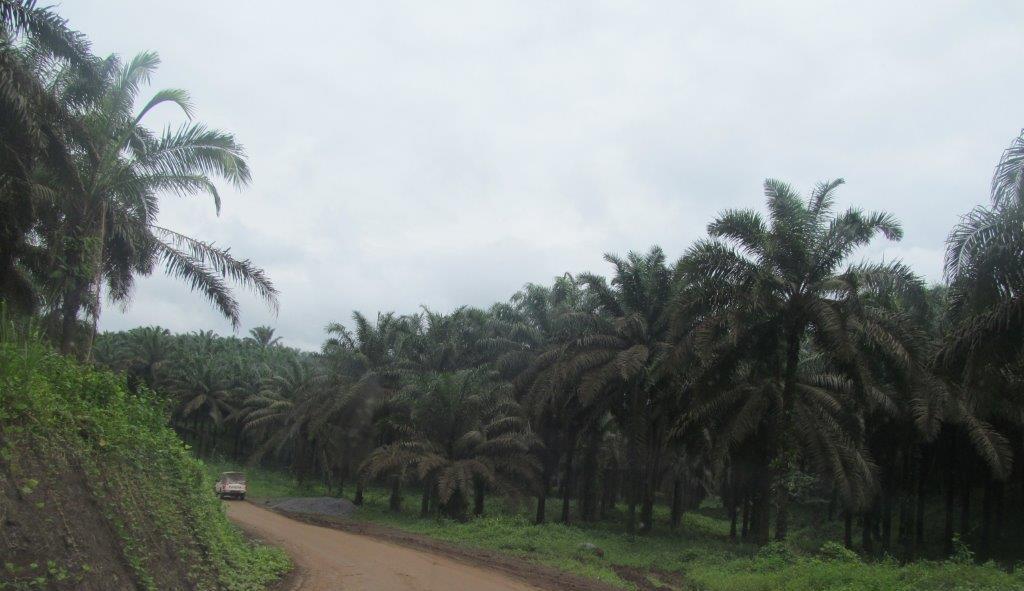Jaff Napoleon Bamenjo and Ngalim Yongabi Bernard, RELUFA, JH Cameroon

Palm oil plantation in the south west region of Cameroon. Photo courtesy of RELUFA
Land grabbing is a contemporary political problem in Cameroon with various interests – agro-industries, infrastructure development, mining, on-shore oil exploration and timber industries – competing for land. But one project has stood out prominently in the last four years and has provoked considerable social mobilization where various stakeholders called for its reframing or total cancellation – the Herakles Farms palm oil project in the South West region of Cameroon.
The palm oil project has generated a lot of attention in recent years, both from national and international civil society organizations, since the 2009 signing of the land convention between the government of Cameroon and Herakles Farms. Advocacy campaigns led both by national and international civil society organizations and networks, aligned with the demands of local communities impacted by the project, have not only succeeded in pushing the government of Cameroon to reframe the project, but have also produced positive multiplier effects.
The primary and most significant accomplishment of the advocacy campaign is the revision of the 2009 established convention between Herakles Farms and the government of Cameroon. A presidential decree was signed on November 25, 2013, revising the total land area granted in the concession from 73,000 hectares to 19,843 hectares. The land lease value increased from 500FCFA ($1) per hectare per year to 3,333FCFA ($6.80) per hectare per year. Furthermore, the original 99 year lease was trimmed down to a three-year temporary land lease; lease extensions being contingent on Herakles Farms judiciously respecting the investment agreements.
The Herakles debacle precipitated an undeniable need for the establishment of a palm oil strategy in Cameroon. Although attention has been focused on Herakles Farms, there are many more foreign companies currently seeking to acquire about one million hectares of national lands for the establishment of palm oil plantations. The Government of Cameroon, through the Ministry of Agriculture and Rural Development, brought together stakeholders in the palm oil sector to brainstorm and define a national strategy on palm oil. While the process has not yet been completed, RELUFA, the Joining Hands network in Cameroon, and its allies are advocating for a sustainable national palm oil strategy which focuses on developing indigenous small scale producers rather than agro-industrial producers which compete with local communities for land.
Another significant effect of the Herakles campaign work is the use of Public Interest Litigation which is a relatively new mechanism to seek justice in Cameroon. Public Interest Litigation (PIL) is the introduction of a case in court for the interest of the public. Generally, it is introduced either by the court itself or by an interested party. Justice Awasom Florence held that, “Public interest litigation is intended to promote and vindicate public interest which demands that violations of constitutional or legal rights of a large number of people who are poor, ignorant or in a socially or economically backward position should not go unnoticed or un-redressed.” PIL is vital to the poor who cannot afford legal fees and court dues, as well as those marginalized and discriminated against. Court cases are usually very expensive, and require both time and energy which tend to be deterrent factors to aggrieved individuals. However, through PIL, one single court judgment could have broad ramifications beyond individuals and communities directly affected by an action. PIL also strengthens communities and local populations to impact decisions of interest by economic and political groups.
In Cameroon, the Environmental Management Code of 1996 in its Article 8 (2) authorizes local communities and duly registered associations with the prime objective of environmental protection to sue when an act directly or indirectly causes prejudice to the collective interest they are out to defend. In application of this law, Counsel for SEFE, a local civil society organization in Mundemba in the South West of Cameroon, argued in the 2011 Case against Herakles Farms, that: organizations can be Plaintiffs in matters relating to environmental protection.
Despite the difficulties witnessed in the practice and enforcement of PIL in Cameroon, the mere fact of its introduction in the environmental code and its application in the Herakles Farms case is significant progress. However, it will be important that more civil society organizations seek to use Article 8 (2) of the environmental management code to enforce the proper use of the environment.
![]() You may freely reuse and distribute this article in its entirety for non-commercial purposes in any medium. Please include author attribution, photography credits, and a link to the original article. This work is licensed under a Creative Commons Attribution-NonCommercial-NoDeratives 4.0 International License.
You may freely reuse and distribute this article in its entirety for non-commercial purposes in any medium. Please include author attribution, photography credits, and a link to the original article. This work is licensed under a Creative Commons Attribution-NonCommercial-NoDeratives 4.0 International License.